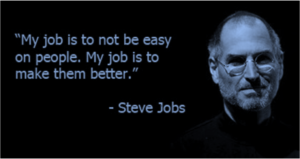The Point: We’ve come to the conclusion a long time ago: Executive coaching for leaders is definitely beneficial. Beneficial for the executive, beneficial for the leadership team, and beneficial for the organization overall. However, while having a leader that has undergone coaching is a crucial leadership development step for the organization, unless coaching reaches all members of the leadership team, we typically see other leading executives find it ‘hard’ to move forward in the face of new challenges. In this post, we discuss the benefits of executive coaching for the entire leadership team… Enjoy!
Enhancing the Effectiveness of Your Leadership Team
Whether it is individual or group training, the job of an executive coach is to first identify where the team stands at the beginning of the engagement sessions. This typically involves identification of the best ‘players’, the leaders with potential for exponential growth, and even the weakest links. If there is something lacking, the coach will immediately suggest remedial action right at the onset so that things start off at the right footing.
Identify Collective Goals for the Team
Just like a sports coach drafts the team and formulates strategies for game-day, the coach will identify some common goals for the team, including those which will serve as motivation for all the leaders to work together. Of course, the coach will rely on the suggestions and feedback of each leader involved in the engagement (including stakeholders), which in itself is a constructive leadership team-building activity.
Constant Improvement
One of the hallmarks of leadership development programs is that executives lose the fear of taking risks and making mistakes. Instead of trying to avoid making mistakes or covering them up, leaders should actually aim to learn from them. But as mentioned at the beginning of this post, why leave the process of learning for the upper echelons of management to chance? A coach for the group allows the leadership team to grow together, collectively learn to reflect on their setbacks, and apply lessons learned to ‘up’ their game with each passing year.
Coaching Makes Team Members Accountable
As people learn to work with collective effort in a team setting with pre-defined expectations, this will typically instill discipline and accountability in the organization. Sometimes, the best organizations barely manage to keep their head above the water due to a lack of accountability. Coaching acts to make leadership team members accountable… Accountable to themselves, accountable to each other, and accountable to their organizational stakeholders.
Coaching Brings Out the Best in People
As you are busy fulfilling your leadership duties in the organization, you may simply not get the chance to gage the individual strengths and weaknesses of their stakeholders. But once the leadership team begins working within a coaching engagement, each member is encouraged and motivated to bring out their best and strive towards reaching their true potential.
Summary
A sports team cannot train, play, and win without the guidance of a coach. In similar vein, the longer you delay implementing an executive coaching program for the leadership team in your company, the more you will keep it from reaching true potential.
If you’d like more information about Tip of the Spear’s Business Advisory Services, consisting of Centered Executive Coaching, Leadership Development through ‘The Leadership Challenge’ methodology, and Communication Skills Training for Leaders use the CONTACT US page of this website.




